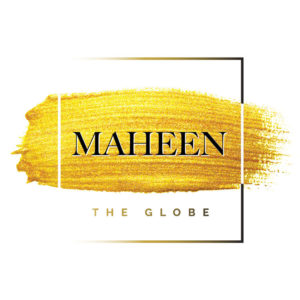Hasil Qureshi’s Exclusive Interview on MTG
By Maheen Mustafa
Lahore, Pakistan: In the studio surrounded by a chaotic sprawl of music equipment, Hasil Qureshi and Fawad Khan crafted Parwana, a track that has set hearts ablaze and sparked whispers of a musical comeback. Hasil meticulously produced and composed the track.
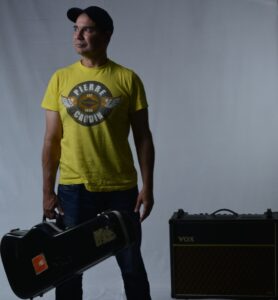
The song, born from a shared passion for music that defies genre, is a testament to a burst of epiphany and an organic spell of creativity. “Fawad and I discuss a lot of music—any genre,” Hasil recalls, laughing about how their animated exchanges leave others baffled, thinking, “Yeh larkay paagal ho chukay hai!”
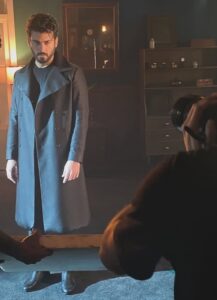
When asked about his friendship with Fawad, Hasil lit up with nostalgia. “We go way back to the early 2000s, rocking the stage—me with Entity, Fawad with Paradigm, two bands carving their own paths at the time,” he recalled. “Ahmad Ali Batt’s legendary gig nights were where we became good friends and vibed creatively. A few years after I stepped away from Entity, the band ‘Entity Paradigm’ was formed—a fusion that changed the game.”
It’s this raw, unfiltered connection that laid the foundation for Parwana, a track that came together when Hasil was listening to the haunting melancholy of Pink Floyd’s Final Cut and the cinematic grandeur of Adele’s Skyfall and Imagine Dragons’ anthems.
The concept for Parwana wasn’t planned; it unfolded naturally, almost serendipitously. Hasil, who admits he’s not one to follow things “to the T,” found inspiration in Bilal Lashari’s visual concept for the song, which existed even before the melody took shape. “Unintentionally, we adhered to that,” he says, describing how the track’s emotional and epic tone was deliberate yet instinctive.
Fawad’s aesthetic, far from run-of-the-mill, demanded a sound that made listeners ponder—a melody that lingered like a memory you can’t quite place. Hasil experimented with melodies, some of which didn’t click at first and were set aside for future projects. But when he proposed the one that became Parwana, it was an instant fit. “It just clicked for everyone,” he says, a spark of pride in his voice.

The emotional core of Parwana is its open-endedness, a deliberate choice rooted in Hasil’s evolution as a producer. “In my early days, I’d make a song about something specific,” he reflects. “But someone else would hear it and have an entirely different understanding.” Learning from this, Hasil and his collaborators—Fawad, lyricist Adnan Dhool, and the Velo Sound Station team—crafted Parwana to be a canvas for listeners’ own stories, open to interpretations.
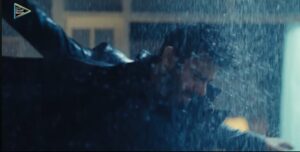
The studio process was anything but ordinary. Amid the creative whirlwind, an unexpected twist added a layer of drama: a thief broke into the studio, swiping personal gadgets and Fawad’s guitar. Hasil turned detective, scouring city cameras to recover the stolen guitar. “Fawad calls and asks, ‘Sir, gaana kahan tak pohoncha?'” Hasil recounts, mimicking his own exasperated reply: “Sir, main aapka guitar lenay aagaya hoon!” Fawad urged him to focus on the song, not the guitars. Yet, it was the reverb tail of Fawad’s guitar — before it got stolen —that set the haunting, nostalgic tone for Parwana. “That spoke to me,” Hasil says, “and that set the song.”
Hasil told Fawad to try unique things with his note choice during recordings and recalled, “We went wild on vocal takes!” The result? A staggering 800 to 900 vocal takes, layered with the richness of 200 tracks, including choir-like backing vocals that amplified the song’s cinematic depth. “He’s an excellent singer,” Hasil notes, recalling how Fawad’s first take left him beaming with confidence.
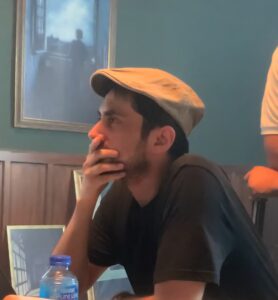
Velo Sound Station, where Parwana was born, is more than a studio—it’s a creative haven. Hasil credits the team—Bilal Lashari, Fawad Khan, Hassaan Khalid, and Ammara Hikmat—for its magic.
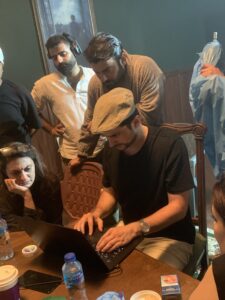
“It’s the team I was lucky enough to work with,” he says, reflecting on past collaborations like Waar with Bilal and this being his first project with Ammara. The freedom to experiment without endless revisions allowed Parwana to retain its raw, unpolished soul.
But where does Parwana fit in today’s Pakistani music landscape? Hasil is blunt: “It doesn’t!” The track wasn’t crafted to chase trends or revive the early 2000s rock era. “It’s something we wanted to do, and we did it,“ he says defiantly.
Yet, its universal appeal lies in its honesty. “When a song is written honestly, it transcends,“ Hasil explains, a nod to why Parwana resonates globally, from Pakistan and beyond.
Hasil’s influences—prog rock, Pink Floyd, and Cory Wong’s funk-orchestral innovation —infuse the track with a unique blend of pop and cinematic orchestration, distinct from the traditional pop mold. “Funk and orchestras don’t usually mix, but Cory Wong pulls it off with brilliance!“ Hasil exclaimed. “He’s a funk guitarist at heart, but his genius redefines what’s possible.”
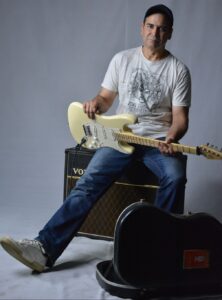
As Parwana trends across platforms, sparking buzz about Fawad’s potential musical comeback, Hasil remains focused on his ongoing projects. “I’m diving into the hidden gems of Gilgit-Baltistan and KPK, unearthing the raw, vibrant subcultures that don’t get the spotlight they deserve in mainstream music.“ Hasil emphasized.
He is reimagining folk tunes in Shina, the core language of the region, and Balti, a language that echoes from Nepal to Ladakh and parts of India. “These aren’t just songs—they’re stories of our roots. Traditional folk can feel repetitive, with melodies that don’t always evolve or reach the emotional peak that young listeners crave. So, I’m infusing them with fresh twists—dynamic builds, gripping climaxes—to make these timeless tunes pulse with energy and speak to a new generation and preserve our folk music,” Hasil explained.
He’s also mixing and mastering Dil Chaahay, his cherished production from 18 years ago, aiming to make it sound grander without altering its essence.
On the broader music scene, he sees promise in platforms like Spotify and Pakistani Idol, which helped talents like Zamad Baig rise from obscurity. Yet, he warns of commercialization’s pitfalls, advocating for live music circuits to nurture authentic artistry. “Music is not a business; it’s an organic thing,“ he insists, pointing to bands like Junoon and Queen, who stayed true to their vision until the world caught up. In a world of cultural divides, like the controversies surrounding Pakistani artists in India, Hasil keeps it simple: “I just make songs that I feel are nice. If it bridges gaps, great. But aap gaana toh sunay, please.“
Parwana—like a moth drawn to a flame—burns with raw emotion, inviting listeners to find their own light in its open-ended narrative. For Hasil, it’s not just a song; it’s a testament to the power of creative freedom, collaboration, and the courage to tenaciously chase a melody that speaks to the soul.

Maheen Mustafa wrote this feature. She is a social impact journalist, global strategist and founder of MTG, a Seattle-based media outlet and production house that aims to elevate and amplify BIPOC and immigrant narratives and perspectives through impactful storytelling. Maheen’s beats are social impact, wellness, culture, climate, race and global news @MaheenM_.
